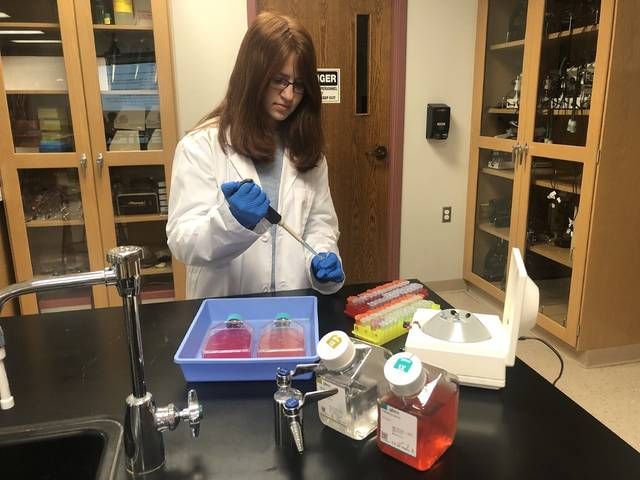
MMI Preparatory School sophomore Rachael Betz, shown here working with centrifuged macrophage cells, used MMI’s 2019-2020 Science National Honor Society grant to fund her Pennsylvania Junior Academy of Science research project on the respiratory distress caused by vaping. The liquids in the tray are different colors because one represents her experimental set and one is her control set.
Submitted photo/MMI Preparatory School
Click here to subscribe today or Login.
Sixteen-year-old budding scientist Rachael Betz does not vape, but when she’s passed by people who have surrounded themselves with that characteristic, billowing cloud, she’s noticed, “It does smell ‘good.’”
She wishes people her age wouldn’t let a candy-like aroma fool them into thinking the practice is harmless.
“Lots of teens vape, and lots of them don’t know how bad it is for them,” said Betz, a sophomore at MMI Preparatory School in Freeland whose Pennsylvania Junior Academy of Science project involved research into ways vaping can cause respiratory distress.
The project, for which she used mouse immune cells called macrophages plus other scientific supplies ranging from growth medium to cellular detergent to cell extraction tools and contrast dye, earned Betz a First Award, a perfect score and an Excellence Award in Microbiology at the PJAS regional competition, held Feb. 29 at Wilkes University in Wilkes-Barre.
It also won her the right to attend state-wide competition at Penn State’s main campus, but that event has been canceled due to coronavirus concerns.
“That would have been fun,” noted Betz, who in a telephone interview earlier this week said she is keeping busy with assignments her teachers have posted online as well as “reading lots of books and walking my dog a lot. This is a lot of time to not be in school; I don’t want to let it go to waste.”
Using time wisely seems to come naturally to Betz, who also recently completed a project about 19th-century abolitionist Frances Harper. Her presentation won first prize in her school’s Black History Month (February) competition.
But that involved historical research; the young scholar finds science even more fascinating.
“I wanted to do something timely and topical,” she said, explaining how, with help from her mentor Michael Mele, who chairs the MMI science department, she designed a project that would research the effect oil used in e-cigarettes and Juul devices has on immune cells.
The immune cells were murine, which means they came from mice. “They come in a little vial,” she said, adding that the immune cells are macrophages, which means “large eaters.”
The macrophages are designed to remove toxins from the respiratory tract, and her project showed that “yes, the macrophages do take up the oil,” which is basically vegetable glycerin and propylene glycol.
“If oils are clogging the macrophages,” Betz said, “that can’t be good.”
The supplies for her PJAS project cost several hundred dollars, but that was not a problem. Betz was awarded MMI’s 2019-2020 Science National Honor Society Grant to fund the research.
“The MMI Science Department pushes the limits,” said Mele, the science department chair. “Our students are using technology and engaging in experimentation which is traditionally only encountered in post-secondary educational programs.”
“Culturing mammalian cells is no easy task and requires specific instruments, like CO2 injection incubators and precise measuring and quantification techniques. Although our lab doesn’t currently have a CO2 injection chamber, we designed microenvironments using a small-scale ad hoc CO2 diffuser and an array of stabilizing buffers to offset changes in pH.”
“Last year, the MMI purchased a Vernier UV-VIS spectrophotometer that detects molecules that absorb light in the UV range, where many of Rachael’s molecules exist. The technology helped her show a potential scenario of how vaping affects alveolar (sacs in the lungs) macrophages. Rachael’s work has shed incredible insight into the respiratory condition brought about by vaping and produced a stellar PJAS project.”
“I’m incredibly proud of Rachael and all of our PJAS students,” Mele continued, “and so happy to see her earn the recognition she deserves for her hard work.”
Betz, who is the daughter of Dr. Amy Houm of Tamaqua and Richard Betz of Honesdale, said she isn’t sure what kind of path she wants to follow — probably not a pediatrician like her mom — but believes it will be “definitely something to do with science.”
Reach Mary Therese Biebel at 570-991-6109 or on Twitter @BiebelMT





